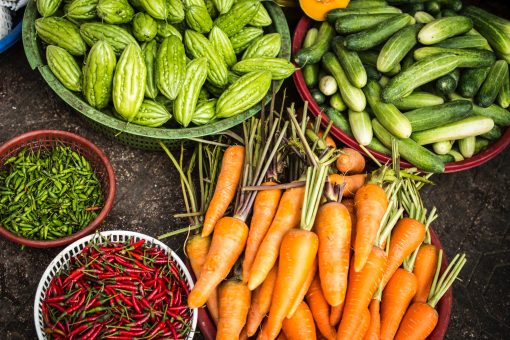Following the keto diet can be extremely difficult, especially if you’re just starting out on your new lifestyle change. A lot of people who are joining the ketogenic lifestyle may go ahead and assume that all fruits and vegetables are safe to consume on keto, not fully aware that there are actually some fruits and veggies that should be avoided and not consumed because of their high carb content.
Topic Contents
Can I eat fruit?
When switching over to the ketogenic diet, fruit is definitely the most confusing part of what to eat and what not to eat. For many years, fruit has always been marketed as something to healthy to consume in our diets.
While there are some fruits that can be healthy when consumed in moderation, on a ketogenic diet, the biggest aim is to consume a lower amount of carbohydrates (under 30 grams a day). In most fruits, one piece of fruit would be the majority of your carbohydrate intake for the entire day.
Fruits have natural sugars (called fructose) running in them, ketogenic users have to carefully monitor the amount of low carb fruits that they intake each and every day. This means that berries (raspberries and blackberries) are the fruit of choice for the majority of people on the ketogenic diet.
Just as a general rule, avoid any medium or large sized fruits, as they will have too many sugars in them and will take you out of ketosis.
However, if you are cutting fruits out of your diet, make sure that you’re replacing the fruits with vegetables. You can easily get the nutrients that you receive from fruits from your daily vegetable intake, except with a lower amount of sugar (and carbs)!
Below, we have created a list of fruits that are appropriate to eat on the ketogenic diet, the number of carbs per a serving, and the serving size of the fruit. All other fruits that are not on this list have not been included because their sugar content is too high.
| Fruit | Net carbs (per 100g) | Serving size |
| Avocado | 1.84 | ½ medium avocado |
| Tomato | 2.69 | One small tomato |
| Rhubarb | 2.74 | Two full stalks |
| Coconut meat | 6.23 | One cup w/ shredded |
| Starfruit | 3.93 | One medium |
| Raspberry | 5.44 | ¾ cup |
| Blackberry | 4.31 | ¾ cup |
| Strawberry | 5.68 | ¾ cup |
| Honeydew melon | 5.68 | One cup |
Can I eat vegetables on keto?
Vegetables are a great thing to eat on keto and can actually replace a lot of the vitamins and minerals that you’re missing out on by not consuming fruit. However, just like fruits, there are some vegetables that should be avoided because the starch content is too high! As just a general rule on keto, if it’s leafy or if it’s green, you can have it! However, if it’s a starch, it should be avoided on keto, especially if you’re just starting out.
Keep in mind that keto is a low carb diet, but that does not mean that it’s a no carb diet. While vegetables do have carbs in them, veggies have a lot of fiber in them too! Fiber is discounted when you calculate your net carbs, which means that you’re going to subtract the total carb value from the total fiber value.
For example, if a food has 12 grams of carbs, but it has 8 grams of fiber, your total net carb intake is 4. This means that you may have more wiggle room to add to your veggies than you think you do!
Below, we have a list of the veggies with the lowest carb intake.
| Vegetable | Carbs (per 100g) | Serving size |
| Cucumber | 1.9 | 1/3 of a cucumber |
| Kale | 4 | One cup |
| Spinach | 0.2 | One cup |
| Swiss chard | 4 | One cup |
| Broccoli | 1.8 | ½ cup |
| Iceberg lettuce | 1 | ½ head |
| Zucchini | 3 | 1/3 of a zucchini |
While the veggies that we have above have the lowest carbs out of a lot of veggies, there are still a lot of other veggies that you can eat! You can either eat these veggies in smaller amounts or whatever you so choose, but here’s the list:
- Alfalfa sprout
- Asparagus
- Artichoke
- Arugula
- Avocado
- Banana pepper
- Beet greens
- Bok choy
- Broccoli
- Broccoli rabe
- Brussels sprout
- Butterhead lettuce
- Cabbage
- Cauliflower
- Celery
- Chard
- Collard greens
- Iceberg lettuce
- Jalapeno pepper
- Mushroom
- Mustard greens
- Okra
- Radish
- Red tomato
- Romaine lettuce
- Rutabaga
- Spaghetti squash
- Spinach
- Summer squash
- Turnip
- Yellow tomatoes
- Zucchini
Make sure that you stay away from:
- Potatoes
- Peas
- Corn
- Yucca
- Parsnips
- Beans (including green beans)
- Yams
- Legumes
What can I eat on keto?
In simple terms, you should be eating real food, meaning that you should be limiting your consumption of foods that are processed. Meats, eggs, fish, nuts, yogurts, vegetables, and some fruits are safe to eat on the ketogenic diet.
Not to mention, that while you’re on the keto diet, you should also avoid any food that has preservatives, colorings, and any GMO ingredients. Keto isn’t just about losing weight, but it’s also about adopting a healthier lifestyle for yourself. On keto, you can eat:
- Grass-fed and wild animals:
Grass-fed meats such as beef, lamb, venison, and goat, wild-caught fish and seafood, pastured poultry and pork, pastured gelatin, ghee, butter, and eggs. - Grass-fed liver, heart, kidneys, tongue, and other organ meats.
- Healthy fats (list of fats you are allowed to eat while on keto diet)
- Monounsaturated fats (avocado, olive oil)
- Polyunsaturated omega 3s (seafood, fish)
- Saturated (butter, coconut oil, ghee, duck fat, chicken fat, goose fat)
- Fruits:
- Avocado
- Non-starchy vegetables
- Leafy greens (spinach, lettuce, chard, radicchio, chives, endive, bok choy, Swiss chard)
- Celery, asparagus, zucchini, bamboo shoots, cucumbers
- Beverages
- Water
- Coffee (black, with cream, or with coconut milk)
- Tea (herbal or black)
- Condiments
- Lemon juice, lime juice, or zest
- Whey protein, egg white protein, and gelatin
- Mayonnaise, pesto, bone broth, mustard, pickles, fermented foods
Occasionally eat
On the ketogenic diet, there are some foods that are okay to eat, but you should only eat them once in a great while. This list includes:
- Alcohol
- Vegetables, fruits, mushrooms
- Root vegetables (spring onion, leek, onion, garlic, winter squash, mushrooms)
- Coconut, rhubarb, olives
- Berries (blackberries, strawberries, raspberries, blueberries)
- Cruciferous vegetables (red cabbage, cauliflower, broccoli, fennel, turnips, white cabbage, green cabbage)
- Nightshades (tomatoes, eggplant, peppers)
- Grain-fed animal sources- Beef, eggs, ghee, poultry, bacon that’s grain fed
- Nuts and seeds- Macadamia nuts, pecans, almonds, walnuts, pine nuts, sesame seeds, sunflower seeds, hemp seeds.
- Fermented soy products- Black soybeans, edamame
- Condiments- Stevia, Swerve, Trivia, ketchup, sugar-free gums and mints
Completely Avoid
On the ketogenic diet, there is a decent list of foods that you should avoid, which include:
All grains
- Wheat, rye, oats, barley, corn, bulgur, sorghum, rice, buckwheat, sprouted grains, white potatoes, quinoa, pasta, bread, pizza, cookies, crackers, table sugar, agave syrup, ice creams, cakes, sweet puddings, soda.
Processed foods
- Avoid foods contains carrageenan (almond milk products), MSG, sulfites, BPAs, wheat gluten
- Artificial sweeteners
Tropical fruit
- Pineapple, mango, banana, papaya, dried fruits, fruit juices
Conclusion
In summary, here’s a quick little chart for you to look at to understand what’s okay and what’s not okay to eat on the keto diet.
| Okay to eat on keto | Not okay to eat on keto |
| Vegetables that grow above ground | Vegetables that grow below ground |
| Avocado, berries, melon | Any other vegetables |
At the end of the article, you should always be cautious when looking to eat fruit or vegetables on the ketogenic diet. When you’re looking to limit your daily intake of carbohydrates, it’s best to stick to berries and dark greens.
If you’re looking to replace your daily dessert with fruits, try to keep your fruit consumption to a moderate amount, only occasionally eating and not over-indulging in your fruit intake. At the end of the day, fruit is the candy that nature produces, so it does contain a rather high amount of fructose, which can have negative consequences on your ketone production when over consumed.
Additional Readings:
- The Best Keto Snacks to Include in Your Keto Diet
- The Best Keto Friendly Restaurant Chains
- Mediterranean vs Keto Diet
- Common Mistakes to Avoid on the Keto Diet That Will Keep the Weight Loss Coming
- Keto Diet vs Vegan Diet
- The Best Vitamins to Take on the Ketogenic Diet
- Whole30 vs Keto Compared
- 5 Best Ketogenic Books in 2018
- 8 Best Fruits for Weight Loss (That You Can Have Anytime!)
- How to Find the Best Diet Plan (That Actually Works in 2019)
Alt Protein Team is a team of professionals and enthusiasts committed to bringing you the most up-to-date information on alternative protein, health and wellness, workouts, and all things health-related. We’ve reviewed a lot of products and services so you don’t have to guess when you spend your hard-earned money on them. Whether you want to shed some pounds, build lean muscle or bulk, we can help you figure out what you need to do and what you need to have to achieve your goals.








